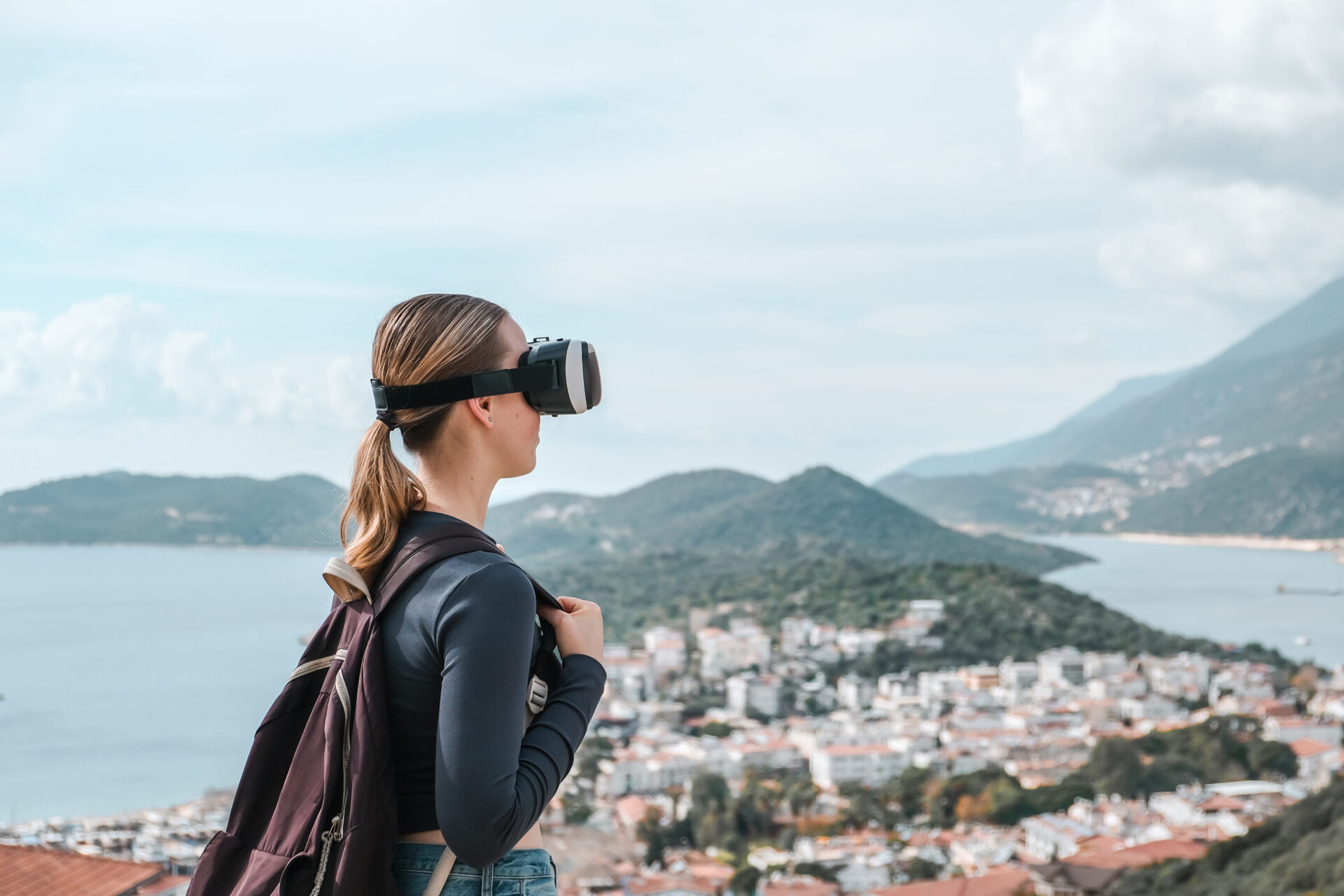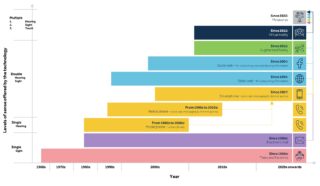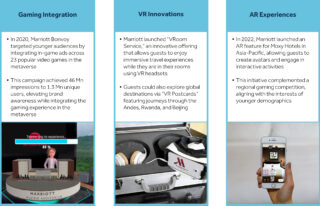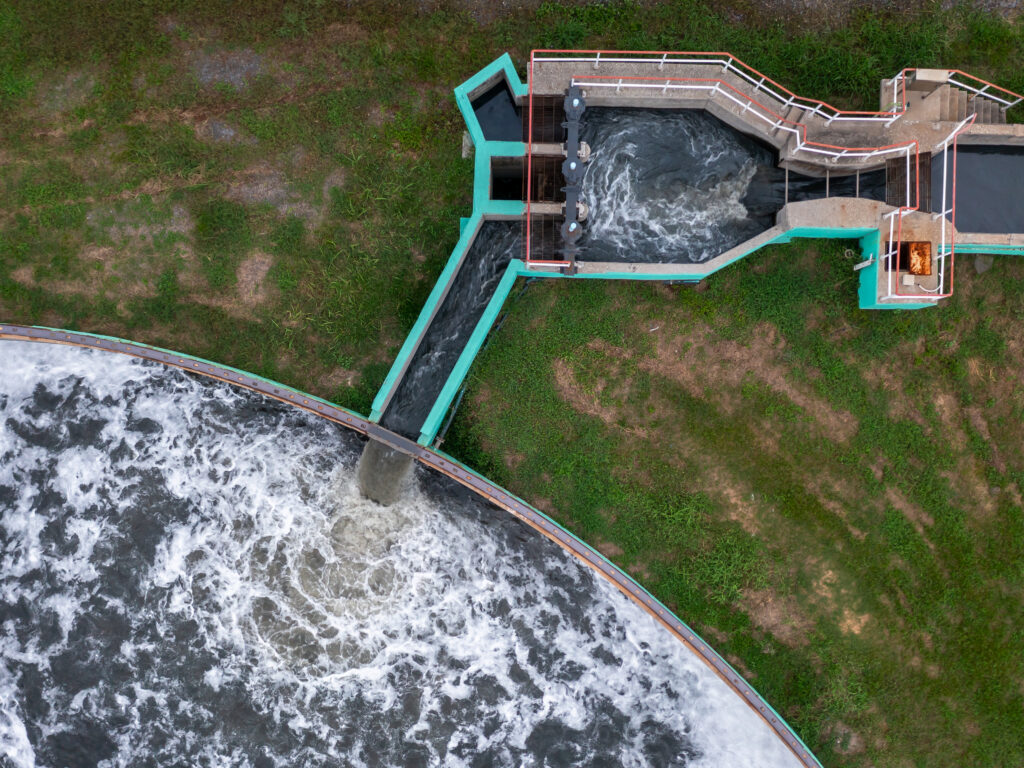
Introduction
Imagine visiting and exploring the Eiffel Tower or Tower of Pisa from the comfort of your home. This is the promise of metaverse tourism, where virtual reality (VR) and immersive digital worlds offer a new way to experience travel. While some analysts express concerns that metaverse tourism could negatively impact the industry by replacing physical tourism, it is undeniable that industry leaders understand that this innovative technology is changing how we explore the world, providing access to limitless destinations and experiences.
Understanding Metaverse Tourism: A New Era of Digital Exploration
Metaverse tourism is the experience of exploring virtual worlds through immersive technologies using augmented and virtual reality (AR & VR). It allows users to visit digital replicas of real-world landmarks offering a new dimension to traditional tourism. Unlike physical travel, which requires people to be present and engage with real-world surroundings through all senses, metaverse tourism offers a primarily visual and auditory experience. While virtual travel lacks the tactile and emotional connection of physical travel, it offers unmatched accessibility, sustainability, and the opportunity to explore destinations that might otherwise be out of reach for the average traveler.
Key Features
Metaverse tourism offers various key features that differentiate it from traditional travel:
1. Immersive Environments: The experiences are powered by VR and 3D simulations where users can visit digital replicas of famous landmarks or imaginative destinations. The virtual worlds create a feeling of presence and engagement within them.
2. Accessibility: Any individual with an internet connection can access metaverse destinations from any location. The barriers related to physical location, cost, or mobility limitations are non-existent, making travel available to a more global audience.
3. Social interactions: Users can interact with each other in multiple ways be it through meeting or touring together which creates a sense of community. Hence, mirroring the communal aspect of physical travel without the constraints of geography.
4. Customizable Experiences: Any traveler can tailor their experience to their schedules and experience destinations at their own pace and method, with a common theme being the addition of interactive elements such as games or learning experiences.
Technologies Behind Metaverse Tourism
The evolution of information and communication technologies over time has developed from single sensory technologies such as the mobile phone to multi-sensory innovations like the metaverse:
 Source: Tourism Management Journal
Source: Tourism Management Journal
Underpinning the Metaverse’s Multi-Sensory Experience are Five Key Technologies:
1. Virtual Reality (VR) and 3D Modelling: Users may virtually tour famous sites with a sense of presence and authenticity thanks to lifelike digital copies of such locations.
2. Augmented Reality (AR): Improves real-world settings by adding virtual guidance, historical context, and up-to-date information to visitor encounters.
3. Artificial Intelligence (AI): Provides specialized recommendations, customized virtual tours, and create captivating narratives that guarantee unique and significant experiences.
4. Blockchain and Non-Fungible Tokens (NFTs): Opens new revenue streams for tourism operators and creative business models by enabling safe transactions in the metaverse and verified ownership of distinctive virtual assets.
5. Haptic Feedback: Seeks to replicate touch in virtual spaces, bridging the gap between real-world and virtual travel and producing more realistic and immersive experiences.
Metaverse Applications in the Tourism and Hospitality Industry
The metaverse is reshaping the tourism and hospitality industry by integrating immersive technologies such as VR, AR, blockchain, and AI to enhance customer experiences. Hotels, travel agencies, and tourism boards are leveraging digital twins, virtual tours, and interactive booking systems to provide travelers with pre-trip exploration, personalized experiences, and real-time engagement.
Notably, Qatar Airways, Singapore Tourism Board (STB), and Thomas Cook have successfully leveraged metaverse technology to promote travel and tourism. Qatar Airways launched “QVerse,” a virtual reality platform that allows users to explore aircraft cabins and airport lounges which features a Metahuman cabin crew for an interactive and engaging experience. The Singapore Tourism Board introduced “Virtual Singapore” which is a 3D digital twin of the city that enables potential visitors to explore key attractions and cultural experiences interactively. Global travel group Thomas Cook launched “Try Before You Fly”, an in-store VR travel experience which led to 190% increase in excursion bookings for New York after visitors tried 5-minute VR holiday version.
Case study: The Marriott Metaverse Adventure
As companies continue to innovate, one standout example is Marriott International. The world’s largest hotel chain has embraced the metaverse to redefine guest experiences and connect with younger, tech-savvy travelers. As part of its innovation strategy, Marriott has leveraged gaming, VR, and AR to maintain its leadership position in the hospitality industry.

GCC Developments in Metaverse Tourism
GCC countries are actively harnessing metaverse technology to promote tourism and enhance visitor experiences. Notably, the UAE and Saudi Arabia are developing nationwide metaverse strategies and using the technology to showcase cultural heritage, iconic landmarks, and unique attractions.
Dubai Metaverse Strategy
Dubai’s Metaverse Strategy aims to position the city among the world’s top ten metaverse economies and a global innovation hub. Focused on tourism, education, and healthcare, it plans to create 40,000 virtual jobs by 2030 while attracting blockchain and metaverse companies through accelerators and investments.
The strategy’s tourism pillar aims to enhance visitor experiences using AR, VR, and digital twin technologies to enhance immersive visitor experiences, while AI, blockchain, and IoT drive real-time, interactive travel solutions. Supported by 5G, edge computing, and real-time data processing, the strategy strengthens Dubai’s digital transformation and leadership in metaverse-driven tourism. Key implementations of this strategy include the Dubai Museum of the Future’s immersive AR and VR experiences and Dubai Airport’s use of AI-powered virtual customer service allowing global audiences to explore pavilions virtually.
Saudi Arabia’s Metaverse in AlUla
As part of Vision 2030, Saudi Arabia is integrating metaverse technology into its AlUla project, a major heritage and tourism initiative focused on restoring and developing one of the Kingdom’s most historically significant regions. Home to archaeological sites and UNESCO-listed landmarks, the Kingdom is enhancing tourism experiences with metaverse features by creating digital twins and virtual reconstructions of AlUla’s landmarks. These high-resolution 3D models allow global audiences to utilize VR headsets to explore the AlUla’s ancient tombs, historic villages, and rock formations remotely, preserving their integrity while promoting cultural diplomacy.
Beyond conservation, the Kingdom is adopting the metaverse for blockchain-based tourism experiences and AI-driven virtual guides, allowing users to engage with historical narratives in real-time. By embracing metaverse innovation, Saudi Arabia is not only safeguarding its rich history but also positioning itself as a cultural and technological leader in the GCC and beyond.
Future Outlook
The metaverse is poised to transform the tourism industry by offering new ways for travelers to explore destinations, engage with experiences, and make informed decisions before booking a trip. While metaverse tourism is still in its early stages, current adoption trends and technological advancements indicate a strong trajectory for growth.
Current Adoption vs. Future Potential
Currently, metaverse tourism is primarily used as a pre-travel inspiration tool, allowing users to explore destinations virtually before committing to a physical trip. A 2022 survey by Euromonitor International found that the most popular activity that involved the use of virtual technology was wearing a VR headset to explore travel destinations pre-trip, with 44% of respondents stating they have participated in this. Additionally, 43% of travelers stated that virtual reality influences their travel choices, while 46% are more likely to visit a destination if they can experience it virtually first. This demonstrates how digital exploration is already shaping consumer decision-making.
Consumer Engagement and Economic Growth
Consumer interest in metaverse tourism is steadily increasing, particularly in virtual events and experiences. According to Accenture’s 2022 survey, 50% of consumers expressed interest in purchasing virtual travel experiences, such as sightseeing tours or hotel stays. Additionally, 54% of consumers indicated that they have purchased or are interested in purchasing tickets for concerts, shows, or sports events held in virtual worlds. These trends highlight a shift in how travellers engage with experiences where physical and digital tourism start to be explored separately.
This rising consumer interest is also fueling market expansion, with projections pointing to substantial growth in the metaverse tourism sector over the coming years. The sector is expected to grow 27% annually from 2025 to 2028 to reach a market size of USD 244 billion indicating the increasing adoption of immersive tourism technologies across the industry.
Challenges and the Road Ahead
Despite its rapid growth, metaverse tourism still faces barriers to mainstream adoption. While the technology offers convenience and accessibility, it has yet to replicate the full sensory and emotional depth of real-world travel. 60% of travellers agree that virtual travel cannot replace the fulfilment of physically being at a location, indicating that metaverse tourism will likely serve as a complement rather than a replacement for physical travel.
However, as sensory enhancing technologies such as haptic feedback advance, travelers may soon be able to physically interact with virtual environments, experiencing sensations like sand beneath their feet or the warmth of the sun. This innovation could bridge the sensory gap and further enhance the appeal of metaverse tourism, making it a more viable alternative for a certain demographic of travelers such as lower income individuals who cannot afford to travel.
Conclusion
Overall, metaverse tourism is revolutionizing the travel industry by offering immersive and accessible experiences that were once unimaginable. By leveraging technologies like VR, AR, and AI, it enables users to explore iconic landmarks, cultural sites, and entirely fictional worlds from the comfort of their homes. These advancements are not only enhancing accessibility but are also fostering inclusivity, allowing individuals with physical, financial, or geographical limitations to experience global destinations virtually.
Pioneering efforts by industry leaders, such as Marriott International, and strategic initiatives like the Dubai Metaverse Strategy demonstrate the transformative potential of virtual tourism. These programs are not just redefining how destinations are marketed but also creating new opportunities for economic growth, cultural preservation, and sustainability. The global metaverse tourism market is geared for rapid growth, driven by technological innovation and a rising demand for personalized and interactive travel experiences.
While metaverse tourism cannot entirely replicate the sensory and emotional engagement of physical travel, it serves as a powerful complement, offering preliminary explorations, alternative experiences, and sustainable solutions. As technology continues to evolve, the metaverse is set to become an integral part of the tourism ecosystem, reshaping how we explore and connect with the world.
References:
- University of Niagara Falls Canada (2024)
- Journal of King Saud University (2024)
- Arab News (2024)
- Istanbul Aydın University (2024)
- ISM Inc. (2023)
- UAE Government Portal (2023)
- Tourism Management Journal (2023)
- McKinsey & Company (2023)
- Deloitte (2022)
- Harvard Business Review (2022)
- Accenture (2022)
- Euromonitor International (2022)
- Vizualise (2017)
Related articles

Leveraging Digital Twin Technology to Reshape the Customer Experience

Rethinking Water Management for a Sustainable Future


